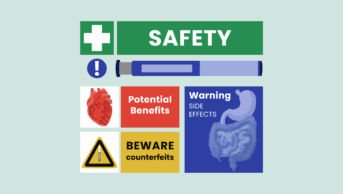
Shutterstock.com
Jason Houghton was 24 years old when he accidently overdosed in a hotel room near Wigan, on a combination of drugs that he had purchased online.
“He was the life of the party,” his father, Keith Houghton, says. “He was a bright boy, who did very well in school. When he left college, he trained as a paramedic, and was one of the top in his class at Preston University.”
Jason “absolutely loved working as a paramedic” with Northwest Ambulance Service, says Houghton. “It was his dream job.”
But the gruelling demands of shift work soon took their toll, with Jason taking increasingly risky steps to get a good night’s sleep. Progressing from over-the-counter sleep medications, Jason began sourcing stronger sedatives, such as benzodiazepines, from websites based in Europe and Asia.
After Jason’s death, coroner Alan Peter Walsh issued a regulation 28 report to former home secretary Theresa May in March 2015, alerting her to the lack of regulatory oversight that contributed to Jason’s death.
Regulation 28 reports are legally required from a coroner when they believe action should be taken by a person, organisation, local authority or government department or agency to prevent future deaths.
There is no regulation of the supply of drugs by use of the internet and there is no protection in place in relation to the importation of drugs using the internet
Alan Peter Walsh, a coroner who issued a regulation 28 report after Jason Houghton’s death
“There is no regulation of the supply of drugs by use of the internet and there is no protection in place in relation to the importation of drugs using the internet,” Walsh wrote in his report, warning that the evidence from his investigation “raised concerns that future deaths will occur unless action is taken”.
Walsh was correct. His warnings on the availability of drugs online were neither the first nor the last to be made by coroners, following deaths similar to Jason’s.
An analysis by The Pharmaceutical Journal of regulation 28 reports, published on the Courts and Tribunals Judiciary website since 2013, has revealed that, as of 14 March 2023, coroners have written 20 such reports, warning that having “freely marketed” drugs available online, with “no regulation” in their supply “clearly constitutes an ongoing risk to the lives of other vulnerable people”.
In the reports, the drugs purchased online ranged from the unlicensed opioid acetylfentanyl — which studies have shown is 15 times more potent than morphine — to the so-called ‘diet pill’ 2,4-Dinitrophenol (DNP), to prescription-only medicines, such as codeine.
The warnings were sent to a variety of regulators, government bodies and agencies, including the Home Office, Medicines and Healthcare products Regulatory Agency (MHRA), Department of Health and Social Care (DHSC), General Pharmaceutical Council (GPhC) and National Crime Agency (NCA).
Their responses to the coroners’ warnings show slow progress towards addressing the call to action.
In March 2014 in response to the first of these warnings, following the death of Jason Nock, a 41-year-old computer technician, from an overdose of a synthetic morphine-like drug that had been purchased online, the Home Office said it was taking “action with industry partners to close UK-based websites trading illegally” in controlled drugs, new psychoactive substances and other medicines.
“We know that there is more to be done in this area, especially given that the market continues to evolve with the rapid development of new drugs,” the Home Office said.
But at least four more deaths occurred from drugs bought online, with coroners making the same calls for tighter regulations, before the Home Office responded to the death of Jason Houghton in May 2015, reiterating that it “continues to work with internet providers to comply with the law”.
“The NCA, the police and the MHRA routinely monitor controlled drugs and medicines being offered for sale on the internet and take action with industry partners to close websites trading illegally in these substances,” it said, adding that the MHRA had closed down one of the websites used by Jason Houghton to purchase drugs.
Despite this, as of 6 March 2023, the Pakistan-based website is back up and running, selling diazepam for US$5.99, tramadol for US$7.50 and morphine sulphate for US$4.99.
“Considerable illegal activity takes place outside of UK jurisdiction and websites identified overseas are referred to the relevant country for appropriate action,” the DHSC said in 2018, when responding to a coroner’s report after Jane Powell, a pharmacist, died from taking large amounts of medicine purchased online.
“However, many set up their operations from countries where there is little, or no, regulatory control. The MHRA therefore works closely with the EU and other international regulatory authorities to ensure that, wherever possible, offending websites are amended to reflect the law.”
Like the coroners before her, Lisa Hasmi, area coroner for Manchester North, said that Powell’s death “demonstrated how easy it is for individuals to obtain large amounts of medication … over the internet”, adding that it was “unclear what action has been/is being taken in order to address the situation”.
In response, the DHSC cited the UK’s involvement in Operation Pangea as an example of “international collaboration to tackle the illegal online supply of medicines”.
Operation Pangea was instigated by the MHRA in April 2006 as the UK Internet Day of Action, before becoming an annual week-long international initiative coordinated by Interpol to target the illegal internet trade in medical products.
During the most recent week of Operation Pangea, in June 2022, law enforcement officials shut down more than 4,000 websites containing adverts for illicit products and made more than 7,800 seizures of illicit and misbranded medicines and healthcare products, totalling more than 3 million items. This included 285,000 items seized by the MHRA.
“This operation shows what can be achieved when national and global efforts combine to tackle this kind of offending,” says Andy Morling, deputy director of criminal enforcement at the MHRA.
“The MHRA’s Criminal Enforcement Unit will continue to work closely with our international partners and Border Force to prevent unlicensed medicines and non-compliant medical devices from entering the UK, and to bring the criminals behind this illegal trade to justice.”
But Tim Mackey, professor in the Global Health Program at University of California San Diego, and director of the Global Health and Data Policy Institute, says Operation Pangea “can go much further”.
“It’s more for advocacy. It’s more for people saying what they’ve done and showing that there’s efforts continuing, and from that standpoint … I think it brings the issue to more attention. And it also forces regulators to do something about it so, in that context it’s pretty good,” he says.
“I wouldn’t say it enhances regulatory harmonisation, because each country is going to take whatever practice it wants to towards this issue, and not necessarily coordinate the same way they need to.”
In 2016, Mackey conducted a literature review analysing the risks and regulatory challenges posed by illicit online pharmacies and concluded that there is a “need for harmonized international regulations” to protect consumers.
It’s really hard to envision some kind of a global process
Tim Mackey, professor in the Global Health Program at University of California San Diego
Mackey says that, as of 2023, this is still lacking. “There’s no regulatory harmonisation aspect to this yet,” he says.
“There should be some standards about what is allowed when it comes to the operation of an online pharmacy, what guidelines are required to ensure that adequate prescribing is taking place, and … some sort of physician–patient relationship, or at least a pharmacist relationship [with the patient], when dispensing.”
However, he says that, because prescribing practices and lists of licensed drugs vary by country, “it’s really hard to envision some kind of a global process”.
“I think you’d have to just do accreditation at the individual country level,” he says. “There is a possibility that you could do it across multiple, high-income pharmaceutical markets, and maybe that would address some of the access issues in high-income countries.”
In the UK, these standards are set by the GPhC. In addition to the five standards to which all UK-based, registered pharmacies are held, those based online are also required to adhere to additional guidelines. And the GPhC has been on a mission to ensure they are followed.
Between April 2019 and December 2021, the GPhC carried out targeted inspections of online pharmacies, taking enforcement action against 48 online pharmacies that failed to comply with GPhC standards. By March 2022, the GPhC had carried out 129 inspections of online pharmacies in total, of which nearly a third received a failed inspection report.
But even these concerted efforts have limitations.
Of the 20 coroner’s reports warning about the supply of drugs online, 8 reports highlighted the risk of accessing medicine through online prescribers, 6 of which expressed concern that there is no requirement for them to contact the patient’s GP before prescribing.
This is particularly a problem “when somebody that’s looking to access medicines is going to a number of different providers in a short space of time”, says Duncan Rudkin, chief executive of the GPhC.
“Each of them can be doing more or less a good job at mitigating the risks associated with each transaction, but nobody’s in a position to put the whole picture together, particularly if the patient is not willing to allow their GP to be contacted … then there’s a kind of a concatenation of risks that come together.
“That’s an example of a big-system issue that is way beyond the remit of the GPhC,” he continues.
Rudkin says this problem is being discussed in “ongoing conversations with other organisations and governments around what more can be done by the whole system”.
The GPhC has been in talks with other regulators over the issues posed by online providers for several years, since signing an agreement to share intelligence in August 2017.
One solution is “supporting patients with information about how to keep themselves safe as consumers, when they’re looking to access healthcare medicines online,” Rudkin says.
As part of this, the GPhC operates a ‘voluntary internet pharmacy logo scheme’ with the aim of reassuring patients that they are purchasing medicines online from registered pharmacies that are required to meet GPhC standards.
This is now the only seal of regulatory approval visible to patients accessing online pharmacies. Britain’s decision to leave the EU has meant that, as of 1 January 2021, online pharmacies based in England, Wales and Scotland are no longer required to display the EU common logo for legally operating online pharmacies/retailers.
One of the big challenges, in terms of patient safety, is where you’ve got overseas-based websites that are, in our terms, not pharmacies at all
Duncan Rudkin, chief executive of the General Pharmaceutical Council
“I think a lot of people find it useful,” says Rudkin. “But I think it’s important not to look to any single kind of solution as a silver bullet. Any logo scheme is only as good as the way in which it’s used. And one of the big challenges, in terms of patient safety, is where you’ve got overseas-based websites that are, in our terms, not pharmacies at all,” he says.
“That’s, I think, a much bigger problem … and no logo scheme that we impose on GB-registered pharmacies would address that because it’s precisely those websites that are beyond our reach.”
However, Mackey says his research has shown that patients “don’t really care” about logos or other credentialing schemes, and are more interested in “what Google provides them as far as search results”.
“So, what you have to do is get these logos and credentialing systems built into technology that people use every day, which is primarily search engines [and] social media platforms that may allow people to host content about purchasing drugs from online pharmacies,” he says.
“It would be nice if all countries agreed the standards for an online pharmacy, and if they don’t meet these standards, that’s going to be put on a blacklist.
“Then that blacklist is essentially disseminated across multiple regulatory agencies, to privacy stakeholders, technology companies, and then those websites are not visible to the public in some way, or they’re not searchable.”
From a technology perspective, Mackey says this should not be difficult to implement, yet a solution that could prevent vulnerable people from having any course to obtain drugs they should not be accessing could still be years away.
“The problem is, there’s too many countries, the supply chain is too diversified … and too much lack of harmonisation just on pharmacy practice and approval of drugs to begin with,” says Mackey.
“I don’t think, in my academic career, we’ll figure it out.”
In the meantime, this regulatory disharmony will continue to rob parents, like Keith Houghton, of time with their children.
“It’s a pandemic of tragedy; this unseen, insidious thing that’s going on,” says Houghton.
“If Jason hadn’t been able to access these drugs online, I know he would still be here.”
Box: Could the Online Safety Bill offer solutions?
The Online Safety Bill was introduced in the House of Commons on 17 March 2022, with the aim of making “the UK the safest place in the world to be online”.
Currently with the House of Lords for consideration, the Bill will require social media platforms, search engines and other apps to tackle illegal activity, including offences under the Misuse of Drugs Act 1971, such as the unlawful supply of controlled drugs and the inciting of any other offence under the Act.
The Bill gives Ofcom the power to fine companies failing to comply with the laws up to 10% of their annual global turnover, force them to improve their practices and block non-compliant sites.
According to government guidance on the Bill: “In the most extreme cases, with the agreement of the courts, Ofcom will be able to require payment providers, advertisers and internet service providers to stop working with a site, preventing it from generating money or being accessed from the UK.” Once the Bill receives royal assent, these powers will be available to Ofcom regardless of where the company is based, as long as the site is accessible to UK users.


